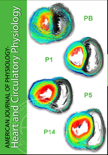
AMERICAN JOURNAL OF PHYSIOLOGY-HEART AND CIRCULATORY PHYSIOLOGY
Scope & Guideline
Elevating understanding of heart dynamics and circulation.
Introduction
Aims and Scopes
- Cardiovascular Physiology and Pathophysiology:
The journal features research that elucidates the mechanisms of cardiovascular function and dysfunction, including studies on heart failure, hypertension, and vascular diseases. - Exercise Physiology:
A significant focus is placed on the effects of physical activity on cardiovascular health, exploring how exercise influences cardiac function, vascular health, and overall physiological adaptations. - Sex Differences in Cardiovascular Health:
Research examining the role of biological sex in cardiovascular physiology and disease is prominent, highlighting the importance of considering sex as a variable in cardiovascular studies. - Innovative Methodologies:
The journal publishes studies utilizing cutting-edge techniques, including advanced imaging, computational modeling, and novel experimental approaches to investigate cardiovascular mechanisms. - Impact of Environmental Factors:
Research investigating how environmental stressors such as air pollution, dietary components, and lifestyle choices affect cardiovascular health is a consistent theme. - Translational Research:
The journal emphasizes studies that bridge basic cardiovascular research with clinical applications, aiming to enhance the understanding and treatment of cardiovascular diseases.
Trending and Emerging
- Cardiovascular Impacts of COVID-19:
Research exploring the cardiovascular implications of COVID-19 has surged, addressing the pandemic's effects on heart health and vascular function. - Microvascular Health:
An increasing number of studies focus on the role of microcirculation and its alterations in various diseases, emphasizing its importance in overall cardiovascular health. - Role of the Gut Microbiome:
Emerging studies examine the interplay between the gut microbiome and cardiovascular health, exploring how gut health influences vascular function and disease. - Cardiac Regeneration and Repair:
There is a growing interest in regenerative medicine approaches, particularly studies investigating cellular and molecular mechanisms that promote cardiac repair following injury. - Machine Learning and Data Analytics:
The application of machine learning and advanced data analytics in cardiovascular research is on the rise, enabling more sophisticated analyses of complex cardiovascular data. - Personalized Medicine Approaches:
Research emphasizing personalized treatments based on individual patient characteristics, including genetic, environmental, and lifestyle factors, is gaining traction.
Declining or Waning
- Basic Mechanistic Studies:
There has been a noticeable decrease in purely mechanistic studies that do not connect to translational or clinical outcomes, as researchers increasingly prioritize studies with direct relevance to patient care. - Traditional Animal Models:
Research utilizing older or less sophisticated animal models may be declining in favor of more refined models that better mimic human cardiovascular conditions. - Pharmacological Studies:
The focus on pharmacological interventions alone appears to be diminishing, with a growing emphasis on lifestyle and behavioral interventions alongside pharmacotherapy. - Isolated Organ Studies:
Research focusing solely on isolated organ systems without integrating systemic physiological context is less frequently published, reflecting a trend towards more holistic approaches to cardiovascular research. - Gender-Specific Studies:
While sex differences remain important, the volume of studies focusing solely on gender-specific cardiovascular responses has seen a relative decline, possibly due to increased integration of sex as a variable across broader studies.
Similar Journals

Revista de la Federacion Argentina de Cardiologia
Exploring breakthroughs in cardiology for global impact.Revista de la Federacion Argentina de Cardiologia is a vital publication in the field of Cardiology and Cardiovascular Medicine, providing a platform for researchers and healthcare professionals to share significant findings and innovative concepts since its inception in 2012. Published by the Federacion Argentina Cardiology, this journal specifically addresses contemporary issues and advancements within cardiology, contributing to the scholarly dialogue essential for improving cardiovascular health. Despite being categorized in the Q4 quartile for 2023 and presently ranking #358 out of 387 in its field, the journal remains committed to fostering academic inquiry and disseminating valuable research for both local and global audiences. Although it is not an open-access journal, it strives to balance accessibility with rigorous academic standards, ensuring quality contributions that are critical for practitioners and students alike. The journal’s ongoing evaluation and adaptation in the ever-evolving landscape of cardiology underscore its importance in advancing cardiovascular science and practice.
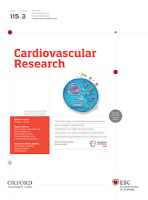
CARDIOVASCULAR RESEARCH
Transforming insights into clinical practice.CARDIOVASCULAR RESEARCH, published by Oxford University Press, is a premier academic journal dedicated to the evolving field of cardiology and cardiovascular medicine. With a remarkable impact factor reflecting its significant contribution to the scientific community, this journal maintains a Q1 ranking in both Cardiology and Physiology categories, demonstrating its commitment to publishing high-quality research that influences clinical practices and healthcare outcomes. Established in 1967, the journal has consistently provided a platform for innovative studies and reviews, aiming to advance our understanding of cardiovascular physiology and pathology. Researchers, professionals, and students will find published articles crucial for their work, as the journal covers a broad spectrum of topics including molecular biology, genetics, and clinical studies. While currently not offering open access options, CARDIOVASCULAR RESEARCH remains accessible through institutional and individual subscriptions, ensuring that the latest findings are available to those in the cardiovascular science community.
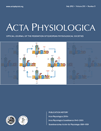
Acta Physiologica
Unveiling the Wonders of Human PhysiologyActa Physiologica is a premier, peer-reviewed journal published by WILEY, dedicated to the dissemination of high-quality research across the field of physiology. With an impressive impact factor reflective of its Q1 category ranking in Physiology for 2023, this journal is a vital resource for researchers, professionals, and students alike, seeking to explore the complexities of biological systems. The journal is indexed with a commendable Scopus rank of #18 out of 193 in its category, placing it within the top 10% of its field, which underscores its influence and citation frequency within the academic community. Acta Physiologica publishes a variety of articles that address fundamental physiological concepts, innovative methodologies, and cross-disciplinary research. With its open access options, the journal ensures that cutting-edge knowledge is readily accessible, fostering an environment of collaboration and advancement in the study of physiology. Spanning from 2006 to 2024, the journal continues to be at the forefront of physiological research and education, encouraging the global sharing of knowledge through its comprehensive content.
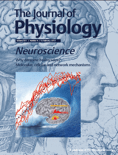
JOURNAL OF PHYSIOLOGY-LONDON
Unveiling the Science of Life and MovementJOURNAL OF PHYSIOLOGY-LONDON, published by WILEY, stands as a prestigious beacon in the fields of Physiology and Sports Science. Established in 1878, this journal has a rich history of disseminating crucial research findings and advancing scientific knowledge, continuing its impact into the present day with an anticipated convergence in 2024. Recognized for its excellence, it ranks in the Q1 category for both Physiology and Sports Science in 2023, cementing its position within the top echelons of academic publications. With a Scopus rank of #26 out of 193 in the Biochemistry, Genetics and Molecular Biology _ Physiology category, the journal boasts an impressive 86th percentile, reflecting its high-quality contributions to the scientific community. Although not open access, its extensive archive and reputation ensure that it remains a vital resource for researchers, professionals, and students eager to stay at the forefront of physiological science. For those looking to deepen their understanding of physiological mechanisms and their applications, the JOURNAL OF PHYSIOLOGY-LONDON is an indispensable resource.

Comprehensive Physiology
Pioneering Insights into Physiological MechanismsComprehensive Physiology is a premier journal published by WILEY, dedicated to the profound exploration of physiological science. With an impact factor that underscores its significance within the field, this journal serves as a pivotal resource for researchers, professionals, and students alike, ensuring access to cutting-edge studies and reviews that span various domains of physiology. It stands proudly in the Q1 category across multiple subfields including Medicine (miscellaneous), Physiology, and Medical Physiology, reflecting its outstanding position within the scientific community. Evaluated within prestigious bibliometric ranks, it boasts an impressive Scopus ranking, placing it in the 12th percentile for medical physiology and 23rd percentile in biochemical, genetic, and molecular physiology. As it converges from 2011 to 2024, Comprehensive Physiology continues to foster a platform for innovative discoveries and collaborative exchanges, thereby contributing significantly to the advancement of medical knowledge and understanding of physiological processes.
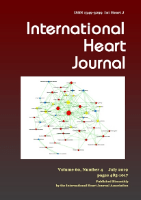
International Heart Journal
Empowering Healthcare Professionals with Cutting-edge InsightsInternational Heart Journal, published by INT HEART JOURNAL ASSOC, serves as a pivotal platform for research and discourse in the fields of cardiology and cardiovascular medicine. With its ISSN 1349-2365 and E-ISSN 1349-3299, this esteemed journal is based in Japan and is located at the University of Tokyo, Graduate School of Medicine, Department of Cardiovascular Medicine. Since its inception in 2005, International Heart Journal has blossomed into a respected publication with an impact factor that signifies its growing relevance, ranking in the Q3 category of both cardiology and miscellaneous medicine as of 2023. This journal not only disseminates vital research findings but also fosters collaboration among researchers and healthcare professionals. Notable for its Open Access options, it ensures the availability of its content to a broader audience, thereby enhancing knowledge transfer and innovation in cardiovascular care. With an ongoing commitment to improve clinical practice and patient outcomes, the journal continues to be an essential resource for those dedicated to advancing the understanding of heart health and disease.

Function
Fostering innovation through open access to cutting-edge research.Function is a pioneering open access academic journal published by Oxford University Press, dedicated to advancing research in the fields of Cancer Research, Cell Biology, Molecular Medicine, and Physiology. Since its inception in 2020, this journal has quickly established itself as a vital resource for researchers and professionals alike, achieving a commendable impact factor in the 2023 rankings, where it stands in the Q2 quartile across multiple categories. Located in the heart of the United Kingdom, Function aims to foster a global exchange of knowledge by providing free and unrestricted access to cutting-edge research, facilitating collaboration and innovation within the scientific community. With a robust focus on emerging discoveries and interdisciplinary approaches, this journal encourages contributions that unravel the complexities of biological functions, paving the way for transformative advancements in healthcare and related sciences. As it converges from 2020 to 2024, Function continues to be an invaluable platform for disseminating research that has the potential to shape the future of medicine and biology.

PFLUGERS ARCHIV-EUROPEAN JOURNAL OF PHYSIOLOGY
Elevating Research in Physiology and BeyondPflügers Archiv - European Journal of Physiology, published by Springer Heidelberg, stands at the forefront of physiological research, showcasing groundbreaking studies since its inception in the 1950s. With a distinguished ISSN of 0031-6768 and an E-ISSN of 1432-2013, this esteemed journal maintains a robust reputation, holding Q1 rankings in Clinical Biochemistry, Physiology, and Medical Physiology as of 2023. Its impressive Scopus rankings place it in the top percentile across various categories, including Biochemistry, Genetics and Molecular Biology and Medicine. Pflügers Archiv serves as a vital platform for researchers, professionals, and students, facilitating the dissemination and discussion of advanced physiological concepts and methodologies. Although it does not currently offer open access, its rigorous peer-review process ensures the highest quality publications that contribute significantly to our understanding of physiological science. Explore the depth of physiological research that shapes our academic landscape today.
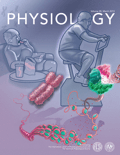
PHYSIOLOGY
Unlocking Insights into Life's MechanismsPHYSIOLOGY, published by the American Physiological Society, is a leading peer-reviewed journal that has attained an impressive Q1 ranking in the field of Physiology, underscoring its significance in advancing research and knowledge dissemination. With a robust impact factor reflective of its high-quality publications, this journal serves as a critical platform for researchers and professionals to publish their innovative findings. Offering open access options, PHYSIOLOGY ensures wide accessibility to cutting-edge research that spans various aspects of physiological sciences. The journal's dedicated focus on interdisciplinary research enhances its appeal to a diverse audience, facilitating collaborations and discussions that push the boundaries of our understanding in physiology. Established in 2004 and converging toward 2024, PHYSIOLOGY stands at the forefront of scientific inquiry, making a substantial impact in the fields of biochemistry, genetics, and molecular biology.

JOURNAL OF PHYSIOLOGY AND BIOCHEMISTRY
Illuminating Pathways in Biochemistry and PhysiologyJOURNAL OF PHYSIOLOGY AND BIOCHEMISTRY, published by Springer in the Netherlands, serves as a pivotal platform for disseminating high-quality research within the fields of physiology, biochemistry, and related biomedical sciences. With an impressive impact factor reflected in its categorization as Q2 in Biochemistry and Q1 in Medicine (miscellaneous), this journal fosters a vibrant community of scholars dedicated to advancing knowledge and innovation. The journal’s broad scope encompasses a wide range of topics from cellular mechanisms to systemic physiology, making it relevant for both theoretical and applied sciences. Researchers and practitioners are encouraged to utilize the available Open Access options to reach a wider audience. The journal’s continuous contribution to the scientific dialogue since its inception in 1996 positions it as a key resource for professionals and students alike, facilitating the exploration of cutting-edge topics and collaborative research opportunities.